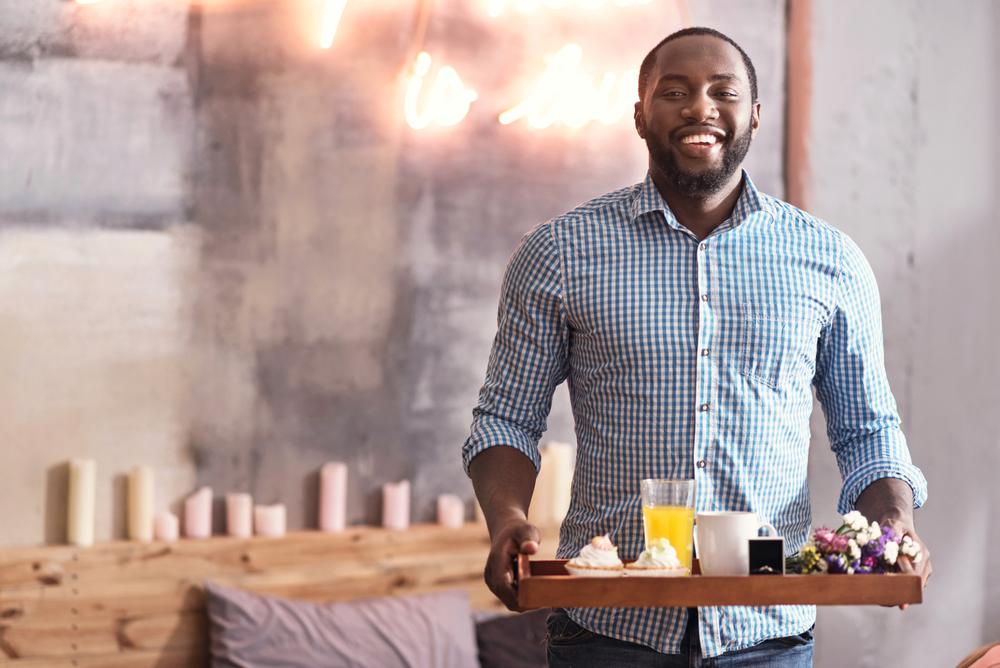Features
This is Why the Nollywood Representation of Domestic Staff Affects Us All
It is very funny – and worrisome – that when we watch all these in movies, we laugh over them. Madam slapped the gateman; “chai, see as that slap hot – e enter.” Nollywood has – to an extent – made the abuse of domestic-helps seem normal.
 If one watches a lot of Nollywood movies, one would begin to think that an average gateman or house-help does not have any sense. If they are not trying to be inanely funny, they will keep saying senseless things that will nearly make you enter your television to slap their faces.
If one watches a lot of Nollywood movies, one would begin to think that an average gateman or house-help does not have any sense. If they are not trying to be inanely funny, they will keep saying senseless things that will nearly make you enter your television to slap their faces.
We are all familiar with all these mumuish scenarios where the oga will come back from wherever he went to and before the gateman will open the gate, he will say a couple of incoherent things or even start dancing that his oga hs back.
If an average gateman is not annoying, he will be disobedient, or over-dramatic, or trying too hard to be funny, or rude to strangers who want to enter the compound, or love food too much, be a womanizer or… whatever. Dear Nollywood, gatemen don’t have to be all of this. Kinji?
It is also the same for house helps; there is always a stereotype that is attached to them – one that makes absolutely no sense. A house help doesn’t always have to be uneducated, wretched, tie scarf all the time, wear mary-amaka skirt or be constantly beaten like a goat because… them no dey hear word.
But come to think of it, if we go beyond the supposed-to-be-funny scenes, we will realize that Nollywood’s (certain) representation of domestic staff is a reflection of who we truly are and how the world operates. If these things do not happen in real life, would they be portrayed in movies? After all, many people claim that movie scripts are being written based on what is obtainable in our world.
If we look beyond the nonsensical scenes, we will notice that there’s a way domestic staff – especially gatemen and house-helps – are being treated in Nollywood movies. The gateman makes one mistake, fiam, he receives a hot slap. He did not open the gate on time? Oga will scream at him and – if someone had offended him before – perhaps rain blows on him.
The house-help gets the worst end of the stick. While the women (mostly young girls) are always at risk of being raped by the oga and then madam will swiftly accuse them of trying to seduce her husband, the boys (also mostly young boys) are always at risk of more physical violence. Irrespective of gender, many, in fact, most domestic-helps in Nigerian work in very horrendous environments. They are mostly overworked, are regularly beaten, they do not attain education and are allowed very little food and sleep. As a matter of fact, the majority are not allowed to sleep in the afternoon.
It is very funny – and worrisome – that when we watch all these in movies, we laugh over them. Madam slapped the gateman; “chai, see as that slap hot – e enter.” Nollywood has – to an extent – made the abuse of domestic-helps seem normal.
Perhaps it is high time we realized that, just like your employees in the office – who you cannot slap anyhow because they are educated, wear suits and will end up calling you out on social media, your domestic staff is a service provider who should be accorded respect. It doesn’t matter if you are paying them 10,000 Naira (we will talk about how domestic helps are underpaid) or you’re paying them 50,000 Naira, you have absolutely no right to lay your hands on your domestic-help. You’re not doing them a favour by employing them or paying their salary. They are rendering a service that you are paying for. It is a transactional something.
Domestic staff should never be treated like second-fiddles in our society. If you could work, take care of your home-front, go to the market, cradle your baby, cook all the meals, open your gate, prune your garden, wash all your clothes by yourself, why would you need a help? But the truth is, you can’t. You need domestic staff to do all these for you, so why do you have that belief that you’re doing them a favour by hiring them. “I picked you from the village and brought you to the city to help you”. No, you’re not helping, you are paying for the services you have consumed!
Talking about payment, if you do not pay your domestic-helps because you are helping them in one way or the other, you’re a wicked person. If you do not pay regularly and then eventually pay half salary, you’re a wicked person. If you give your domestic-helps peanuts, you’re also a wicked person. The current minimum wage in Nigeria is 30,000 Naira. If you pay less than that, you’re a wicked person. If you employ underage kids just so you won’t pay so much – or for whatsoever reason – you’re a very wicked person. In fact, you should be made to face the law.
In fact, it is not enough to just pay your house-help, let them wear fine clothes too. The scarf they have been tying is enough. When you go to KFC, don’t let them sit in one corner watching you eat. Ahan, are you the devil’s relative?
The portrayal of domestic-helps as people who can just be beaten anyhow needs to stop in our movies. We should have more scenes where employers have maltreated their domestic-helps and faced the consequences for their actions. We should have scenes where those who have treated their employees bad have been cautioned (either by their relatives or neighbours) and made to realize why domestic-helps should never be maltreated. Our movies have painted domestic-helps as senseless and deserving of abuse and we cannot continue laughing and kikiki-ing over it.
There is no dishonour in being a domestic help; not everyone will be privileged to go to school and acquire an education. It is appalling that our society looks down on domestic workers and treats them with contempt, yet we cannot do without them.
So dear Nollywood, we love your movies, but can there be more empathy and professionalism in your portrayal of domestic-helps?
Signed,
With love – and a lirru bit of anger.



















